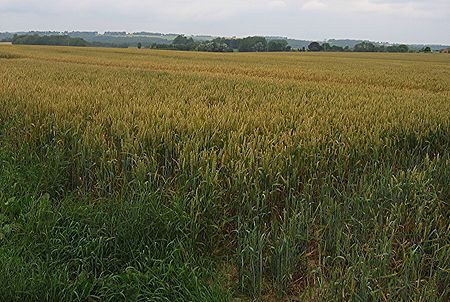
Kedoshim, K'doshim, or Qedoshim (קְדֹשִׁים—Hebrew for "holy ones," the 14th word, and the first distinctive word, in the parashah) is the 30th weekly Torah portion (פָּרָשָׁה, parashah) in the annual Jewish cycle of Torah reading and the seventh in the Book of Leviticus. It constitutes Leviticus 19:1–20:27. The parashah tells of the laws of holiness and ethical behavior, repeats the Ten Commandments, and describes penalties for sexual transgressions. The parashah is made up of 3,229 Hebrew letters, 868 Hebrew words, 64 verses, and 109 lines in a Torah Scroll (סֵפֶר תּוֹרָה, Sefer Torah).[1]
Jews generally read it in late April or May. The lunisolar Hebrew calendar contains up to 55 weeks, the exact number varying between 50 in common years and 54 or 55 in leap years. In leap years (for example, 2024), Parashat Kedoshim is read separately. In common years (for example, 2025 and 2026), Parashat Kedoshim is combined with the previous parashah, Acharei Mot, to help achieve the needed number of weekly readings. Some Conservative congregations substitute readings from part of the parashah, Leviticus 19, for the traditional reading of Leviticus 18 in the Yom Kippur Minchah service.[2] And in the standard Reform High Holidays prayerbook (מחזור, machzor), Leviticus 19:1–4, 9–18, and 32–37 are the Torah readings for the afternoon Yom Kippur service.[3]
Kodashim is the name of the fifth order in the Mishnah, Tosefta, and Babylonian Talmud. The term "kedoshim" is sometimes also used to refer to the six million Jews murdered during the Holocaust, whom some call "kedoshim" because they fulfilled the mitzvah of Kiddush Hashem.
- ^ "Torah Stats for VaYikra". Akhlah Inc. Retrieved October 9, 2023.
- ^ See Mahzor for Rosh Hashanah and Yom Kippur. Edited by Jules Harlow. United Synagogue of Conservative Judaism.
- ^ Gates of Repentance: The New Union Prayerbook for the Days of Awe. Edited by Chaim Stern, pages 452–55. New York: Central Conference of American Rabbis, Revised ed. 1996.